PREVIOUS
SDG Goal wise programs of India (SDG 8) – Part 26
January 19 , 2025
17 hrs 0 min
28
0
SDG Goal wise programs of India (SDG 8) – Part 26
(இதன் தமிழ் வடிவத்திற்கு இங்கே சொடுக்கவும்)
Pradhan Mantri Kaushal Vikas Yojana (PMKVY)
Launched Year:
- 2015 (PMKVY 1.0).
- 2016-2020 (PMKVY 2.0).
- 2020-2021 (PMKVY 3.0 - Pilot Phase).
Ministry or Nodal Agency:
- Ministry of Skill Development and Entrepreneurship (MSDE).
- National Skill Development Corporation (NSDC).
Objectives:
- Enable Skill Development: To provide industry-relevant skill training and certification to Indian youth, enabling them to secure better livelihoods.
- Certification of Prior Learning: To recognize and certify the skills of individuals based on their previous experiences, especially those employed in unregulated sectors.
- Support Employment and Entrepreneurship: Through training, youth can access employment opportunities or become self-employed.
- Promote Vocational Education: To link education with skill development, promoting greater employability.
- Bridge Skill Gaps: To focus on high-demand skills in various industries and new-age sectors like AI, robotics, and 3D printing (PMKVY 3.0).
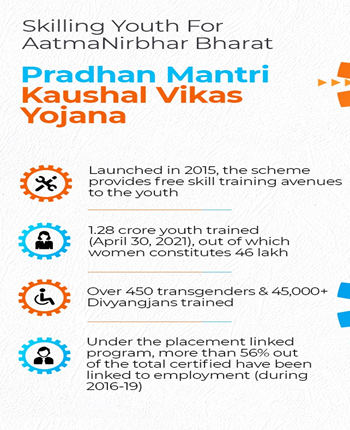
Beneficiaries:
- Youth (Ages 15-29).
- Unemployed or underemployed individuals.
- School/college dropouts.
- Individuals in unregulated sectors with prior experience (for Recognition of Prior Learning - RPL).
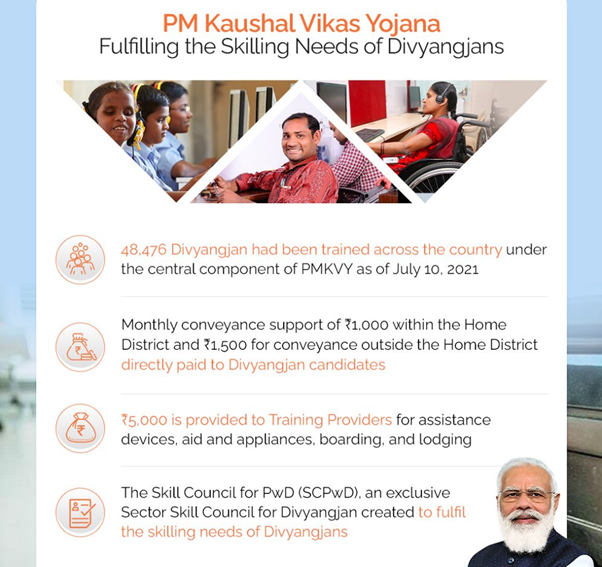
Eligibility Criteria:
- Age Limit: Typically, 15 to 29 years.
- Nationality: Must be an Indian citizen.
- Educational Qualifications: Open to various educational backgrounds, including school/college dropouts.
- Employment Status: Primarily aimed at unemployed or underemployed youth.
- Aadhar Card: Often required for application.
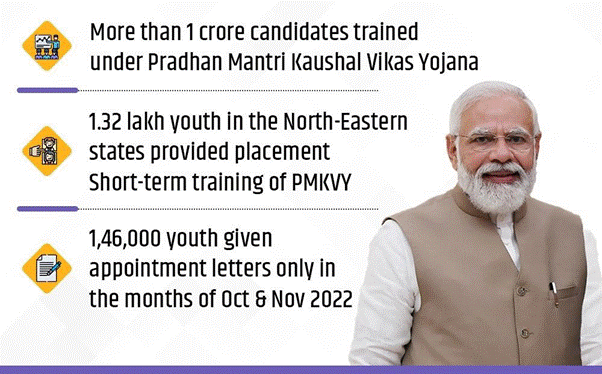
Benefits:
- Free Training: The Government covers training and assessment fees.
- Skill Certification: On successful completion, candidates are awarded skill certification, improving employability.
- Monetary Incentives: Financial rewards upon certification.
- Placement Assistance: Support in finding employment post-training, including through partnerships with industries.
- Entrepreneurial Support: Assistance for individuals interested in setting up businesses.
- Recognition of Prior Learning (RPL): Certification for individuals with existing skills but lacking formal certification.
- Access to Industry-Standard Training: Training provided as per industry needs, ensuring relevance to the job market.
Additional Information:
- Training Duration: Typically ranges from 3 to 6 months.
- Training Delivery: Conducted at PMKVY Training Centres (TCs) across the country.
Components:
- Short-Term Training (STT): Provides structured skill development.
- Special Projects: Involves contributions from government and non-government organizations.
- Kaushal and Rozgar Mela: Periodic events to facilitate training, placement, and awareness.
- Continuous Monitoring: Ensures quality through inspections and audits.
Phase-Specific Features:
- PMKVY 2.0 (2016-20): Focused on expanding sector and geographic coverage, with increased coordination with missions like Make in India and Digital India.
- PMKVY 3.0 (2020-21): Focused on new-age industries and localizing training through District Skill Committees (DSCs).
- Government Funding: The scheme is funded by both central and state governments, with a 50:50 fund allocation.
- Through PMKVY, the government aims to create a robust and sustainable ecosystem for skill development, fostering economic growth and improved livelihoods for millions of Indian youth.
National Skill Development Mission (NSDM)
Launched Year:
- Approved by the Union Cabinet on 1st July 2015.
- Officially launched on 15th July 2015, on World Youth Skills Day.
Ministry or Nodal Agency:
- Ministry of Skill Development and Entrepreneurship (MSDE).
Objectives:
- National Skills Qualifications Framework (NSQF): Implement NSQF to offer long-term and short-term training, leading to employment and career improvement.
- Quality Standards: Ensure high-quality training standards through teaching and benchmarked institutions.
- Focused Outreach: Support weaker and disadvantaged sections of society through targeted skill development.
- Up-skilling and Re-skilling: Provide facilities for up-skilling and re-skilling the workforce, particularly in unorganised sectors.
- Pathways for Transition: Enable transition from vocational training to formal education systems through credit transfer.
- Labour Market Information System (LMIS): Maintain a national database to match demand and supply of skilled workforce and monitor performance of existing programmes.
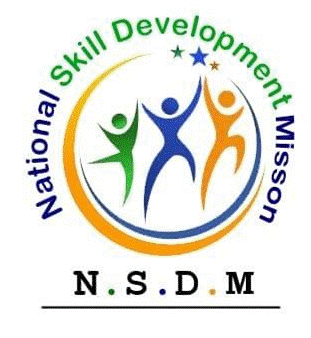
Beneficiaries:
- Any Indian national who is:
- Jobless or a school/college dropout.
- Has a bank account and verified identification evidence (Aadhaar/Voter ID).
Eligibility Criteria:
- Jobless youth, school/college dropouts, or individuals seeking to enhance skills for better employment opportunities.
- Must have an Aadhaar card or Voter ID for identification and tracking.
Benefits:
- Employment Opportunities: Improved job prospects through skill training in technical and soft skills.
- Global Employability: High-quality training standards enable global job opportunities.
- Access to Training: Access to government-sponsored skill development initiatives and placements.
- Sustainability: Empowerment through skill development for sustainable livelihoods.
Additional Information:
- Mission: “To rapidly scale up skill development efforts in India, by creating an end-to-end, outcome-focused implementation framework, aligning demands of employers for a well-trained skilled workforce with aspirations of Indian citizens for sustainable livelihoods.”
- The National Skill Development Mission is part of the Skill India initiative, which aims to enhance the employability of youth by providing them with various skill training programs.
- It includes the Pradhan Mantri Kaushal Vikas Yojana (PMKVY), National Policy for Skill Development and Entrepreneurship, Skill Loan Scheme, and other government programs.
- Sub-missions under the NSDM include Institutional Training, Infrastructure, Convergence, Trainers, Overseas Employment, Sustainable Livelihoods, and Leveraging Public Infrastructure.
- Institutional Mechanism: The mission is supported by the National Skill Development Agency (NSDA), National Skill Development Corporation (NSDC), and the Directorate General of Training (DGT).
Pradhan Mantri Mudra Yojana (PMMY)
Launched Year:
- 2015.
Ministry or Nodal Agency:
- Ministry of Finance.
- MUDRA (Micro Units Development & Refinance Agency Ltd.)
Objectives:
- To provide financial support to non-corporate, non-farm small/micro enterprises by offering loans up to ₹20 lakh (as of 2024).
- To promote entrepreneurship and financial inclusiveness for small and marginalized sectors of society, enabling them to access formal institutional finance.
- To empower women, minorities, and other underrepresented groups, helping them establish or grow their businesses.
- To bridge the gap in financing for micro and small enterprises, particularly in rural and semi-urban areas.
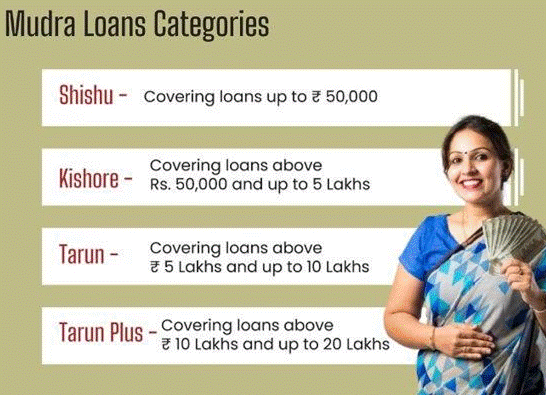
Beneficiaries:
- Micro and small entrepreneurs in sectors such as manufacturing, trading, services, and agriculture (allied activities).
- Women entrepreneurs, as a significant portion of PMMY loan recipients are women.
- Minority communities, with targeted support to encourage their participation in entrepreneurship.
- New entrepreneurs who are looking to start or expand their non-corporate businesses.
- Existing micro-units that have successfully repaid previous loans and wish to expand their business under the Tarun Plus category.
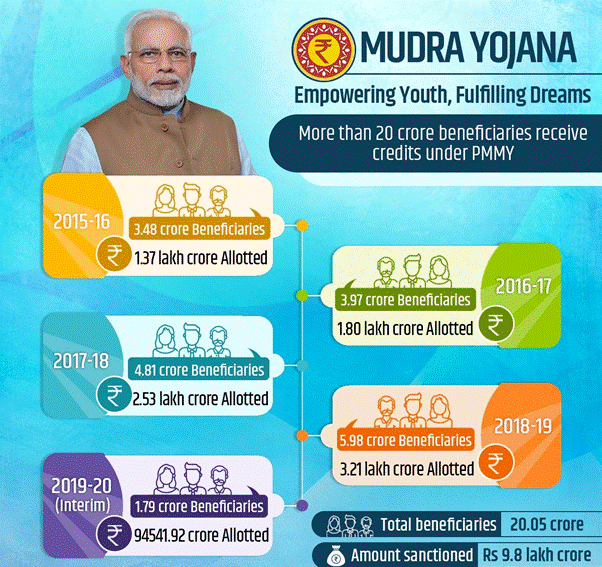
Eligibility Criteria:
- Any Indian citizen with a viable business plan for a non-farm sector income-generating activity.
- The business should require a loan amount of less than ₹20 lakh (₹50,000 to ₹20 lakh depending on the category).
- No collateral required for the loan.
- Must apply through Member Lending Institutions (MLIs) such as Scheduled Commercial Banks, Regional Rural Banks (RRBs), Small Finance Banks (SFBs), Non-Banking Financial Companies (NBFCs), and Micro Finance Institutions (MFIs).
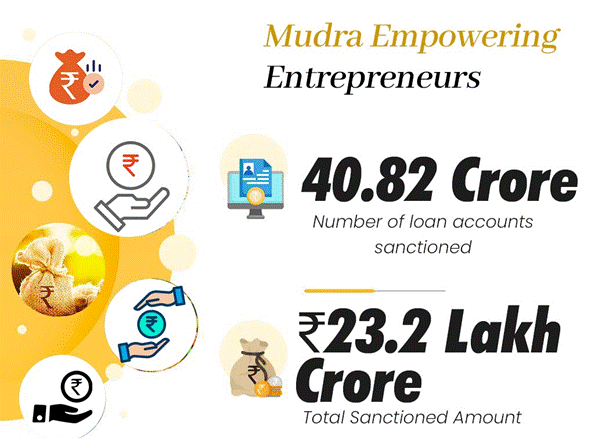
Benefits:
Loan Amount:
- Shishu: Up to ₹50,000 for new businesses.
- Kishore: ₹50,000 to ₹5 lakh for businesses in the growth phase.
- Tarun: ₹5 lakh to ₹10 lakh for businesses looking to expand.
- Tarun Plus: ₹10 lakh to ₹20 lakh for those who have repaid previous loans under the Tarun category.
- Collateral-free Loans: No need to provide any collateral/security to avail the loans.
- Loan Disbursement through Financial Institutions: Loans are disbursed through a wide network of financial institutions, ensuring accessibility for all.
- Inclusive Growth: Special focus on women, SC/ST, and OBC communities, helping uplift marginalized sections of society.
- Support for Rural and Semi-urban Areas: The scheme encourages entrepreneurship in rural areas, promoting job creation and self-employment.
- Mudra Card: Provides a RuPay debit card with an overdraft facility that allows borrowers to draw cash from ATMs or POS machines.
- Interest Subvention: An interest subvention of 2% is provided for prompt repayment of Shishu loans for up to 12 months (announced in May 2020 under the Aatmanirbhar Bharat package).
- Capacity Building: The MUDRA MITRA app provides guidance to loan seekers, helping them approach banks and understand the process.
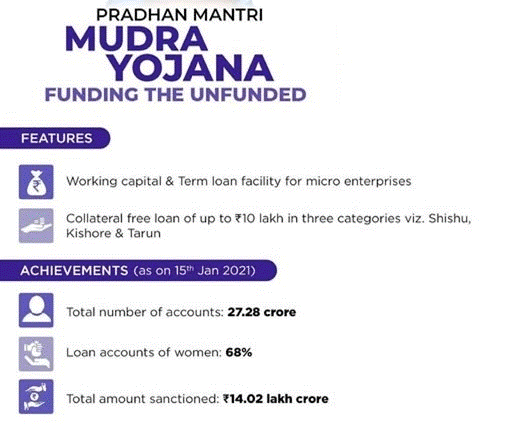
Additional Information:
Achievements:
- Over ₹27.75 lakh crore disbursed to 47 crore small entrepreneurs since its inception.
- 69% of loan accounts are held by women, with significant participation from SC/ST and OBC communities.
- Jobs created across rural and semi-urban areas through enhanced access to credit for small enterprises.
- Loan Application Platforms: Loans can be applied through portals like PSBloansin59minutes and Udyamimitra.
- Mudra App: MUDRA MITRA app provides information and helps loan seekers understand the application process.
- Credit Guarantee Fund: The Credit Guarantee Fund for Micro Units (CGFMU) has been extended to cover the enhanced loan limits under Tarun Plus.
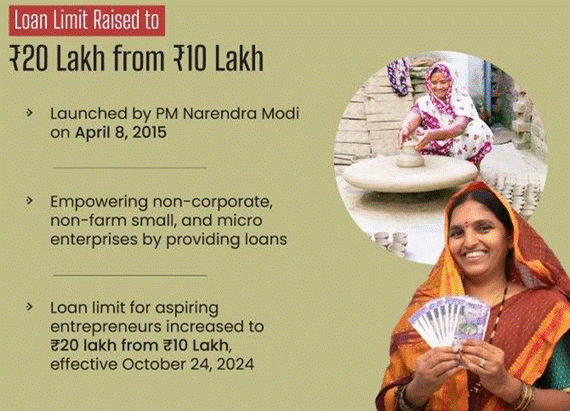
Recent Changes (2024 Update):
- The loan limit has been increased to ₹20 lakh from ₹10 lakh, especially for borrowers who have successfully repaid loans under the Tarun category.
- The new Tarun Plus category has been introduced for loans between ₹10 lakh and ₹20 lakh.
- The Pradhan Mantri MUDRA Yojana continues to play a crucial role in enhancing financial inclusion and empowering entrepreneurs across India.
- With increased loan limits and enhanced support, the scheme is better positioned to support small businesses, contribute to job creation, and foster economic growth, particularly for women, minority groups, and rural entrepreneurs.
-------------------------------------
Leave a Reply
Your Comment is awaiting moderation.


